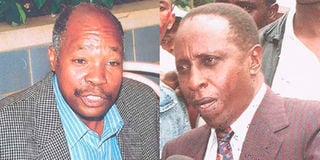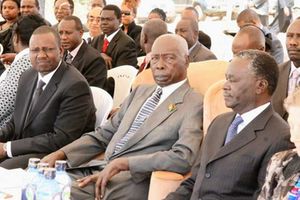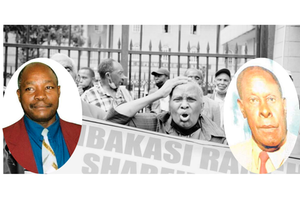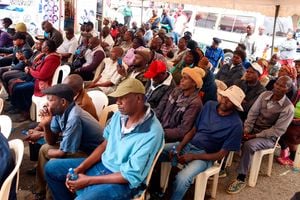
Former politicians David Mwenje (left) and Kuria Kanyingi.
In the theatre of Kenyan politics, few figures matched the fiery flamboyance of David Mwenje and Kuria Kanyingi — men cut from the same audacious cloth, short in stature but towering in bravado. These were not just political foot soldiers; at the height of President Moi’s calculated reshuffle of central Kenya’s political landscape, they emerged as his chosen knights, their gleaming swords sheathed in rivers of cash — torrents of it.
As Kenyans watch the neatly orchestrated censure of Deputy President Rigathi Gachagua, astute observers cannot help but notice familiar patterns resurfacing in the drama surrounding his detractors. Presently, Kikuyu MP Kimani Ichung’wah seems to have assumed the mantle once donned by Arthur Magugu, the shadowy figure who quietly waged war against Vice-President Dr Josephat Karanja, a pawn in a far-reaching conspiracy. Joining the fray to execute the sordid plot were a motor vehicle mechanic Kuria Kanyingi and Embakasi MP David Mwenje, two audacious Nyayo loyalists, renowned for their remarkable flair in the dark art of slander.
Kanyingi and Mwenje’s meteoric rise coincided with a dark conspiracy to topple Dr Karanja, a plot that would cement their place as political hitmen of Moi’s regime. Of the two, Mwenje, a master strategist and long-time political bruiser, was the better-known, especially in the labyrinthine corridors of Nairobi’s political scene. His command centres — whether it was his modest home in the gritty Mowlem area near Kariobangi or the buzzing Leaders’ Bar in Umoja 1 — were veritable war rooms. Here, loyal foot soldiers swarmed like bees, ready for battle. Mwenje understood one immutable rule of the political battlefield: Victory must be ruthlessly won, and he had an unmatched talent for grassroots mobilisation, a skill that kept his adversaries in perpetual retreat.
In the turbulent arena of Embakasi politics, Mwenje reigned as the undisputed maestro, orchestrating chaos with unparalleled skill. Those who followed in his wake, the likes of Ferdinand Waititu were mere imitators, pale shadows of the original, attempting to replicate his ruthless mastery.
Mwenje’s loyalists were rewarded in kind, settling in Nairobi’s Embakasi region, where shanties rapidly sprouted, becoming the very lifeblood of his political base. To trace the origins of the illegal settlements in Embakasi Ranching and the Dandora Farmers land, one need only follow the trail of his devoted followers. This is how Mwenje earned his role in bringing down Dr Karanja.
Standing between Mwenje and Kanyingi was Magugu, bound to them through a shared, shadowy agenda. Mwenje, the puppet master within Parliament’s esteemed halls, was tasked with orchestrating Karanja’s demise, while Kanyingi tarnished his public image with whispers of scandal that Magugu dared not utter aloud.
Land economics
Magugu was a brilliant, and wealthy schemer. He had graduated in 1963 from with a BA degree at La Verne University in California, and later graduated with an MA degree in land economics from the University of Stockholm. In 1969, aged 34, he won the Githunguri seat and held onto it for two decades. His animosity against Dr Karanja was personal. After all, Dr Karanja had twice run against him in Githunguri. If Moi wanted someone to push Dr Karanja out, Magugu offered himself. The Kiambu Kanu rallies became fertile ground of political witch-hunting as Kanyingi led the attacks suggesting that Dr Karanja had claimed that Moi was finishing the central Kenya elites.
Kanyingi was the quintessential showman — every gesture, every move steeped in theatrical flair. There was this time he arrived in President Moi’s Baringo Central constituency with 10 busloads of Kiambu residents and carrying loads of cash in Sh100 notes. His rise to prominence was as improbable as it was meteoric. While Kanyingi was relatively unknown and modestly educated, it was an accidental encounter with President Moi that would shape his destiny. He claimed that he met Moi while working as a humble roadside mechanic after Moi’s car had broken-down. Kanyingi not only repaired Moi’s car, but started a friendship that would catapult him into the political stratosphere. First, he was appointed a deputy director of Motor Vehicle Inspection unit, a position that he used to line up his pockets.
Thus, Kanyingi burst onto the political stage in a whirlwind of wealth, with streams of cash surging his way. His campaigns, veiled in the guise of philanthropy, targeted women’s groups, generously bestowing buses as gifts. Yet, beneath the facade, a scandal brewed. Only the women’s groups in Limuru and Lari ever saw the promised buses; the rest were mere props — rolled out from showrooms for public display at his rallies, only to be quietly returned afterward. This elaborate charade would eventually unravel, setting the stage for Kanyingi’s dramatic downfall later on.
When Mwenje brought a motion of no confidence against Dr. Karanja, Arthur Magugu emerged as a key figure, launching a fierce critique against his fellow villager. In Parliament, Magugu denounced Karanja, declaring that Kenya had no room for “kneel before me” politicians, a scathing reference to the alleged arrogance of the vice president. He further claimed that Karanja had been overheard boasting about acting as President in Daniel arap Moi’s absence. Faced with mounting pressure, Karanja eventually resigned, preferring to step down rather than face the humiliation of a no-confidence vote.
Decisive blow
Mwenje, along with Kanyingi, had earlier accused Karanja of behaving as though he were the de facto President whenever Moi was abroad. Rumours swirled that the vice president was forcing his colleagues to fall in line with his demands. The decisive blow came in March when Moi, returning from an overseas trip, delivered a thinly veiled yet devastating rebuke. In a cryptic remark, he reminded the nation that he had never appointed an acting president — a clear public admonishment of Karanja’s alleged overreach. The message was unmistakable: Karanja had crossed a line, and the political vultures were circling, ready to deliver the final strike.
It was Mwenje (who did not come from Kiambu) who ended the two-month countrywide speculation when he identified Dr Karanja as the subject of the rallies. Addressing Parliament — and apparently Mr Mwenje — Dr Karanja termed the day “sad for Kenya”, arguing that some politicians had lost “a sense of common decency and embraced political thuggery and vindictiveness”.
Though Dr Karanja was compelled to step down in May 1989, Mwenje, for his troubles, found himself rewarded with the post of Assistant Minister for Supplies and Marketing. Yet, as fate would have it, he never spent a full day in that office. His fortunes soon soured, losing the Embakasi seat in the first multi-party elections to Ford Asili's Henry Ruhiu. By 1997, Mwenje had defected to Mwai Kibaki’s Democratic Party, reclaiming the seat with a decisive victory. He repeated his triumph in 2002 under the Narc banner, only to lose to Mugabe Were in the tumultuous 2007 elections. Tragically, Mwenje passed away a year later, leaving behind a mixed legacy.
Meanwhile, Kanyingi’s trajectory took a different turn. By the time of his death in 2014, he had amassed a staggering portfolio worth Sh2 billion, with investments in shares and real estate stretching across Kenya and South Africa. Notably, his controversial acquisition of the potato research land in Kiambu, brazenly seized with impunity, underscored the rewards of his ruthless loyalty. His smear campaign against Dr Karanja, orchestrated on behalf of President Moi, had paid handsome dividends. Kanyingi won the Limuru seat on a Kanu ticket in 2002, but his political star, once bright, quickly dimmed, overshadowed by the very forces he once served. In history, Kanyingi and Mwenje are remembered for the role they played in Dr Karanja’s fall.
And it is not said positively.
@johnkamau1











